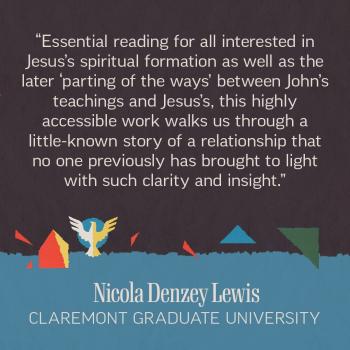I had the opportunity to read Doug Cowan’s latest book The Forbidden Body before it was published, and just recently participated in a recorded Zoom conversation with him and other academics who share our interest in science fiction, fantasy, horror, and religion. Cowan’s book is marvelous – often disturbing and shocking, but it is about sex and horror and so that could not be otherwise. As someone for whom horror is the genre of popular culture in which I’ve had the least personal interest, it helped me make sense of the fascination that many good friends and fellow academics (among others) have for it, and to share that appreciation and what horror does distinctively well. Here’s the blurb I wrote for the book:
Groundbreaking, disturbing, and riveting. Cowan recognizes that horror has a penchant for being at the same time scary and sexy, and that religion likewise has a unique ability to terrify in connection with restrictions on human sexuality. The intersections and even the simple comparability of these two human phenomena has not been explored by academics, much less explored adequately. Only Cowan could write this book, and write it so well.
Here’s the video:
On the new book see also:
https://www.theofantastique.com/2022/02/15/preview-for-cowans-the-forbidden-body/
https://www.theofantastique.com/2022/06/28/doug-cowan-on-the-forbidden-body-at-mark-twain-house/
A while back I wrote a letter recommending Doug Cowan for a particular recognition. Here’s part of what I wrote, which may be of interest to a wider audience:
I have followed Cowan’s work for more than a decade, beginning with his groundbreaking 2010 book Sacred Space. I had published a few articles or book chapters at that point related to the treatment of religious themes and characters in science fiction, and Cowan’s book arrived in that nascent field as a challenge and simultaneously a source of inspiration, playing a substantial role in shifting its course in a more fruitful direction. What had been written on the subject prior to that point had, for the most part, been content to treat the subject matter rather superficially, noting obvious symbolism such as “Christ figures” without always delving deeper. Cowan outlined an approach that looked beneath surface observations, engaging in close reading and analysis of the material. He did not merely point the direction, but led the way, offering his own substantive analysis of several major film and television franchises. I knew immediately both that Cowan was a brilliant and insightful scholar, and that from that point I wanted my own work to live up to the high bar he set—as well as read whatever he published.
Not content to contribute in this manner to the academic study of science fiction, Cowan proceeded to offer similar treatments of other genres, including fantasy and horror. Cowan is at the same time meticulous in his attention to detail and creative in his ability to draw connections and detect echoes between diverse works. The sheer number of books he has published in the past few years alone is in and of itself impressive. At the same time, the content thereof has continued to be of the same extraordinarily high quality. This is, it perhaps goes without saying, not consistently the case when it comes to academics who manage to publish books with impressive frequency. Cowan is exceptional in this regard, offering quantity (and on a diverse array of genres no less) as well as quality. When anyone expresses to me an interest in turning their attention to the academic study of religion in popular genres of film, television, and literature, Cowan’s work is consistently where I point them, as providing a helpful entry point and an example to be emulated.
I am eagerly looking forward to the appearance of the books that he is currently working on. The study of popular culture in general, and of religion in popular culture in particular, was at one point viewed as a less than serious undertaking. Cowan helped change that. His earlier work on new religious movements provided a strong foundation for his more recent work, which is natural given the extent to which science fiction and newer religions have influenced one another. The role of religion in public life, the demonstrable dearth of literacy many have about the religious traditions they claim to align with and about others which they denigrate, and the intersection of both religion and popular culture with phenomena of pressing importance and visible impact such as conspiracy theories, all converge to make Cowan’s work of even greater importance and relevance today than it was when he first turned his insightful gaze to these matters.
I am particularly looking forward to the results of projects that he is currently working on, including books that promise to offer an introductory overview of genres where his past work has tended to be more in-depth and thus illustrative; and also his study of Philip K. Dick. While Dick’s stories have not ceased to be turned into films and television series at any point during the past 3-4 decades, insufficient academic attention has been given to Dick’s fascination with the Valentinian school of Gnosticism, which not only influenced him more broadly, but features as a narrative element in stories such as VALIS. As a scholar who works on Gnosticism (in particular in the form of the still-extant tradition of Mandaeism) as well as science fiction, I await Cowan’s book on Dick with great anticipation. Gnosticism, since the discovery of the Nag Hammadi codexes in the mid-20th century, has grasped popular imagination and these long-lost texts have contributed to a significant subset of popular spirituality that remains influential.
Let me share a few other links related to our shared interest in science fiction and futurism:
Two articles appeared in America magazine, “Do you love sci-fi and religion? You’re not alone” and “From 1980: Science Fiction and Religion.”
Artificial intelligence and tuberculosis treatment
Don’t miss the article that incorporates part of an interview with me about the new book Theology and the Star Wars Universe! And related to that, I will probably need to take a look at the new book by Simone and Claudia Paganini, Im Namen des Vaters, des Sohnes und der Macht: Star Wars und die Bibel. There’s also a forthcoming book by Zanne Domoney-Lyttle to look forward to, The Bible and Comics: Women, Power and Representation in Graphic Narratives.

















